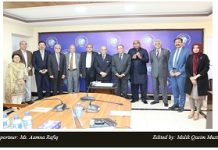The Centre for Afghanistan, Middle East and Africa (CAMEA) at the Institute of Strategic Studies (ISSI) hosted a webinar on “Afghan Refugees in Pakistan: Four Decades of Hospitality.” The webinar was moderated by Ms. Amina Khan, Director CAMEA. The speakers at the webinar included Ambassador Aizaz Ahmad Chaudhry, Director General ISSI, Ms. Nargis Nehan, an Afghan Politician, Mr. Saleem Khan, Chief Commissioner for Afghan Refugees, SAFRON, Mr. Qaisar Khan Afridi, Spokesperson UNHCR Pakistan, Ms. Nasria Pashtun,ALIGHT Pakistan, Program Coordinator for Afghanistan and Mr. Tamim Asey, Founder & Executive Chairman of the Institute of War and Peace Studies (IWPS), Kabul.
Ms. Amina Khan, Director CAMEA, while expressing her views stated that prolonged instability, which has all too often been marred by foreign invasions, civil wars, political and economic instability not to forget natural calamities have resulted in one of the world’s largest protracted refugee populations – the Afghan refugees. She went on to say that continued uncertainty has thus resulted in the continuous outflow of refugees. While Afghan refugees are present in more than 70 countries, 95 per cent are hosted by Pakistan and Iran. Pakistan and Iran together continue to host 90 per cent of registered Afghan refugees globally she stated. She further explained that although, a non-signatory to the Geneva Convention of Refugees, Pakistan has been home to Afghan refugees which at one point numbered five million, thus making Pakistan the second largest refugee hosting nation, hosting 21 per cent of the world’s refugees. As of January 2022, there are approximately 3 million Afghans living in Pakistan, around 1.4 million of them are Proof of Registration (PoR) cardholders, approximately 840 000 hold an Afghan Citizen Card (ACC), and although there are an estimated 775 000 undocumented refugees, the number of unregistered refugees is believed to be far greater since movement across the Pak -Afghan border has traditionally taken place under an unregulated and unmonitored system, thus making it close to impossible to give an accurate number of unregistered refugees.















